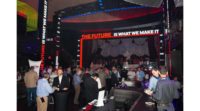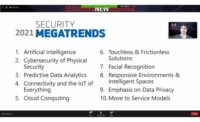Alex Housten joined dormakaba Americas as COO on April 1, during the initial weeks of the COVID-19 pandemic in the U.S. Here, he speaks with SDM about the surge in demand for frictionless access control, the lessons that can be learned from this health crisis and more.
SDM: Where were you working before, and why did you want to take on this role at dormakaba Americas?
Alex Housten: I worked at United Technologies for 15 years building systems, mostly HVAC, fire and security products. I was excited for the opportunity to join dormakaba because it’s a very strong, value-led organization with a high capacity for investment in growth, both organic and inorganic. I know the future is going to be bright because we have the capacity to move our company to the best spot in the industry to grow.
How has dormakaba changed its business strategy since the pandemic started?
We haven’t really changed our strategy. We believe that it’s important to provide employees, channel partners and ultimately end users with a stability based on our values, which are putting the customer first, curiosity, performance, courage and trust. Everything around us is unstable, but we remain the same. Our long-term strategy is growth-oriented, and we’re sticking to that strategy, but we’ve adapted the plan. We’re a strong company from a financial perspective so we didn’t need to take any drastic actions that affect that strategy.
How has the coronavirus impacted the frictionless access control market?
We have been interested in frictionless access control for a number of years from an electronic access perspective, just because people have their hands full and there are a lot of ways to do things from a frictionless perspective. Now it’s taken a whole new element with health we’re super interested in. We’re able to have packages where we can form a full turnkey solution that provides everything from touchless door opening to touchless lodging. Across all our verticals, we have a solution that works for end users. I think that’s a big opportunity.
What new concerns do customers have now, and how can security companies rise to meet these needs?
I think the most obvious emerging concern is people want health screening available in the entry of a facility. Security as health adds a whole new element, and our opportunity is to make that as seamless an opportunity as possible. I’ve seen within our industry, the facilities of our customers and suppliers require temperature checks and other wellness initiatives. As we return to normal business operations, that will only grow.
What is your outlook for the remainder of the year?
Given the overall necessity of our products, I think we’re in a good spot to have a stable remainder of the year. I don’t see a situation where we experience the kind of volatility you see in travel and lodging, but we don’t know what the future holds. We’re prepared for these to be uncertain times, and we’re prepared to execute and stay committed to our strategy regardless. Compared to other industries, I consider our outlook to be positive and strong. We aren’t a discretionary category in most cases.
What lessons can be learned from this crisis?
If you think of this as a health crisis, and the best thing you can do to prepare to survive in the coronavirus times is have a healthy body, it’s no different for a company. You don’t know when a new virus will emerge, and you can never guarantee you’ll be entirely safe, but you do know steps that will make you more likely to be prepared. And that’s the philosophy we take. We do what we can to have a healthy company, and that looks different from before this crisis. Regardless of what we face, from an economic crisis to another pandemic, we are as ready as can be. We believe it’s necessary to partner to provide comprehensive solutions for our end users. Our ability to participate in that way, rather than develop every single solution in-house, is a really important lesson. It’s no longer really a choice of developing in-house. I think the concept of integrating best of breed solutions is forced by these circumstances when there’s no choice but to roll out innovative solutions quickly.




